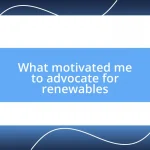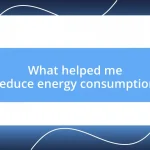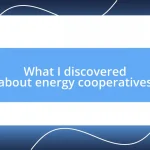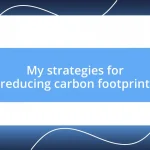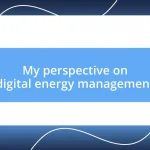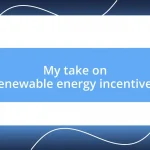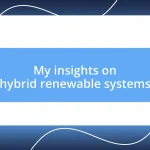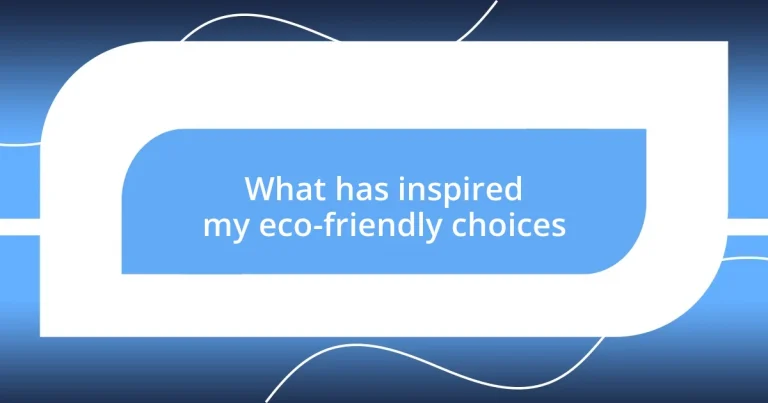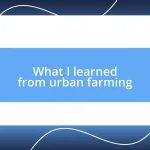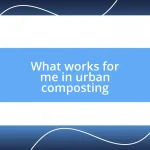Key takeaways:
- Nature-inspired experiences, such as hiking and volunteering, ignite a profound desire to protect the environment and embrace sustainable choices.
- Participating in sustainability education fosters awareness, community connections, and empowers individuals to make informed eco-friendly decisions.
- Adopting eco-friendly practices leads to long-term benefits, including financial savings, personal growth, and a shift in consumer mindset towards supporting sustainable products.
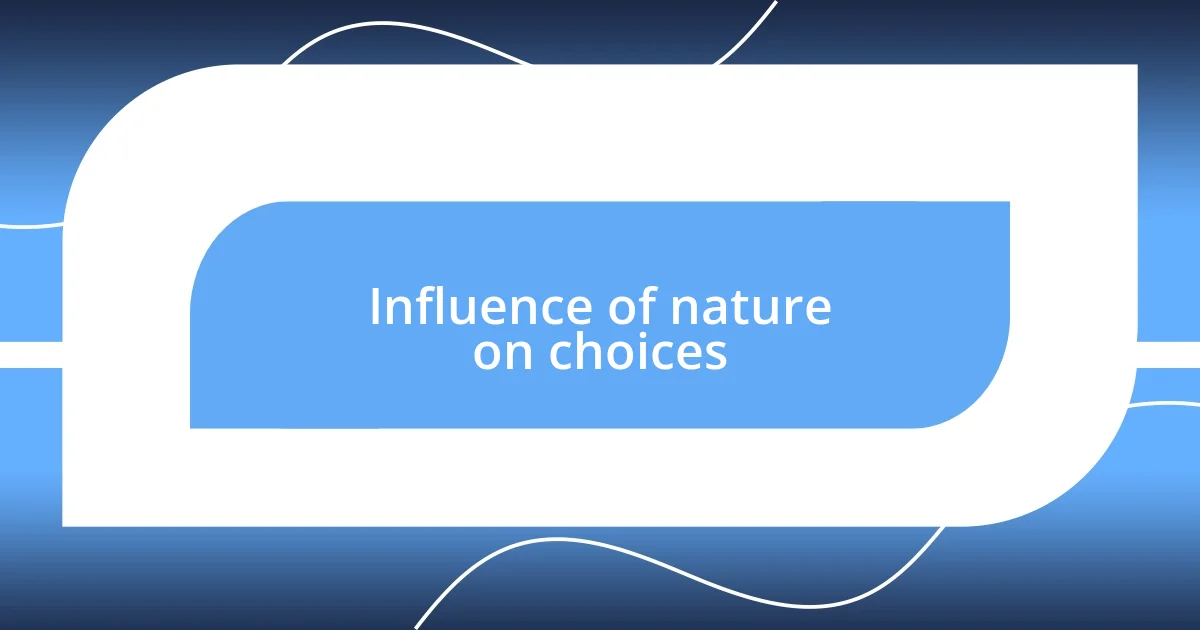
Influence of nature on choices
Nature has always had a profound influence on my eco-friendly choices. I recall a hiking trip where I was surrounded by towering trees and the soothing sounds of a babbling brook. In that moment of calm, I thought, “How could I possibly contribute to the destruction of this beauty?” It sparked a deep desire within me to protect the environment in any way I can.
On another occasion, while volunteering at a local community garden, I connected with the earth in a way I never had before. Digging into the soil and tending to the plants, I felt an indescribable bond with nature. It made me realize that our choices—what we consume, what we throw away—truly matter. Have you ever felt that connection? It’s almost as if the earth calls out to us, urging us to make wiser decisions.
Witnessing the changing seasons has also shaped my perspective. Each autumn, when the leaves transform into vibrant hues, I am reminded of the cyclical nature of life. It makes me ponder: if nature can renew itself beautifully, why shouldn’t we strive for a sustainable lifestyle that reflects that same resilience? This kind of reflection keeps me grounded and inspires me to make choices that align with the rhythms of the natural world.
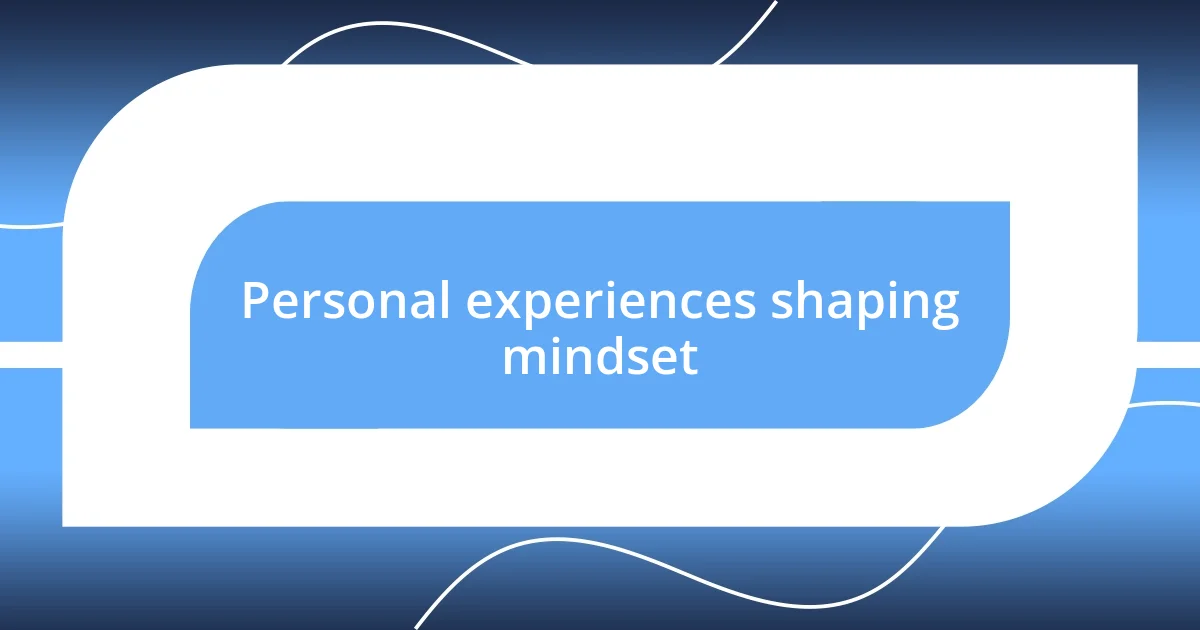
Personal experiences shaping mindset
When I look back on my childhood, I can vividly recall the summers spent at my grandparents’ farm. Running barefoot through the fields, I cherished the simplicity of life close to nature. It instilled in me a deep sense of gratitude for the resources around us. Those moments taught me to respect the land and to understand the importance of sustainable practices.
- I learned how to garden, which sparked my interest in where our food comes from.
- I witnessed firsthand the beauty of a thriving ecosystem and its delicate balance.
- The joy of picking ripe tomatoes and sharing them at family dinners reinforced the idea that every choice has a ripple effect.
Further along in my journey, a significant moment came during a beach clean-up activity. Standing alongside fellow volunteers, I was struck by the sheer amount of waste littering our beloved shorelines. Each piece of trash felt like an affront to the beauty of the ocean. That day, I made a personal promise to reduce my plastic consumption and advocate for cleaner waterways. Such powerful experiences sink deep into our consciousness, steering our choices and priorities in unexpected yet vital ways.
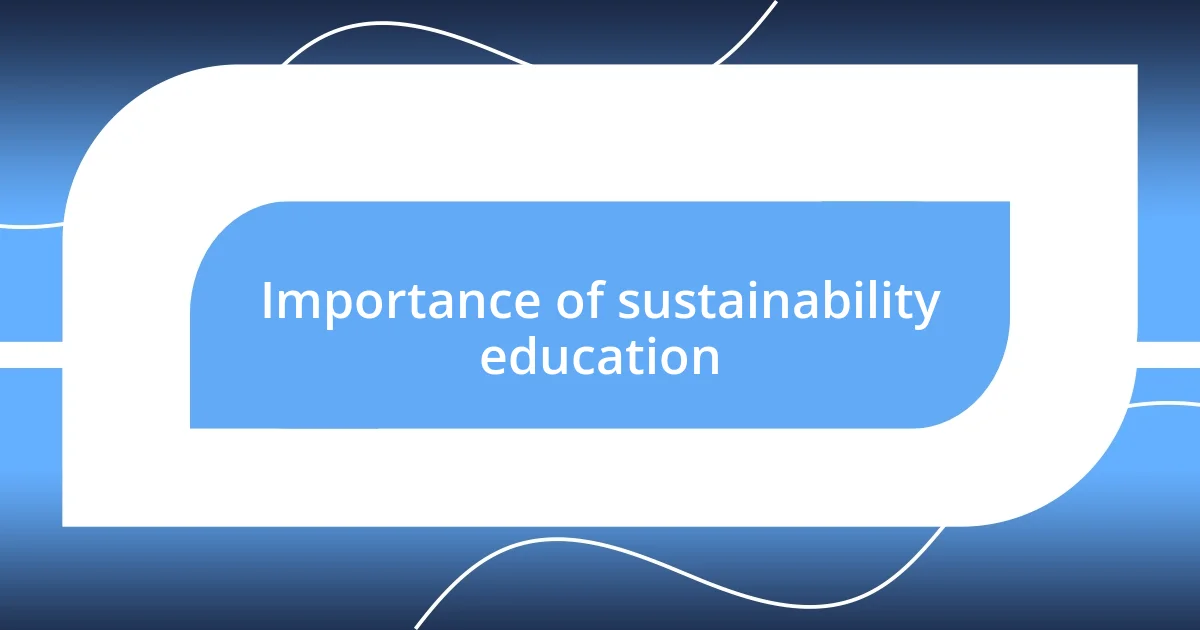
Importance of sustainability education
Sustainability education is vital for fostering a deeper understanding of our environmental impact. I remember attending a workshop about climate change, where I learned about the staggering effects of plastic pollution on marine life. Those statistics truly hit home, igniting a sense of responsibility that I hadn’t fully grasped before. It wasn’t just about facts; it was about the emotional connection to the creatures suffering in silence due to our choices.
Participating in sustainability education can also create a sense of community. I attended a local eco-fair where people shared their experiences and knowledge about green living. Engaging conversations about composting and energy-efficient practices made me realize that I wasn’t alone in my journey. Sharing stories with like-minded individuals sparked new ideas and reaffirmed my commitment to making eco-friendly decisions. I often think: what could we accomplish if we all shared our eco-enthusiasms and learned from one another?
Most importantly, sustainability education serves as a guiding light in navigating our eco-friendly choices. I reflect on how a simple lesson on the lifecycle of products helped me recognize the importance of choosing companies with sustainable practices. This awareness transformed the way I shop and think about consumption. Isn’t it empowering to know that with knowledge, we can shape a better future? Understanding sustainability isn’t just beneficial; it’s necessary for fostering a healthy planet for generations to come.
| Aspect | Importance |
|---|---|
| Awareness of Environmental Impact | Fosters understanding of how personal choices affect the planet. |
| Community Building | Creates networks of support and shared knowledge among eco-conscious individuals. |
| Empowerment through Knowledge | Equips individuals to make informed decisions that contribute to sustainability. |
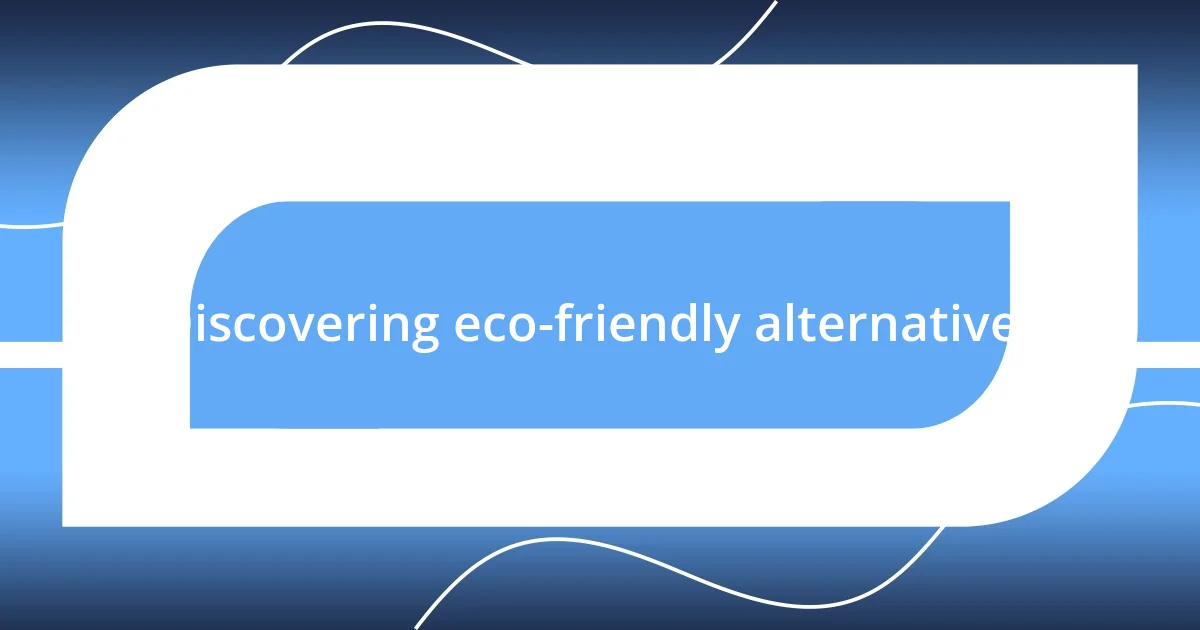
Discovering eco-friendly alternatives
Discovering eco-friendly alternatives has turned into an exciting journey for me, filled with delightful surprises. I remember when I stumbled upon a local zero-waste shop. The vibrant displays of bulk foods and reusable containers inspired me to rethink how I approach grocery shopping. It seemed like stepping into a treasure trove of possibilities—who knew that living sustainably could actually be this enjoyable?
One of my proudest moments came when I decided to experiment with natural cleaning products. I was skeptical at first—could vinegar and baking soda really replace my trusty store-bought cleaners? But after a bit of research and trial and error, I was amazed by how effective they were. Not only did my home feel fresh, but I also found satisfaction in knowing I was reducing harmful chemicals in my living environment. Isn’t it empowering when you discover that simple, household ingredients can do the job just as well?
I often find myself reflecting on the countless eco-friendly alternatives available now. From bamboo toothbrushes to plant-based cosmetics, the options seem endless. Each time I switch to a more sustainable choice, I feel a sense of fulfillment wash over me. It’s like participating in a beautiful movement toward a healthier planet. What if more of us embraced these small yet impactful changes? Just imagine the collective difference we could make.
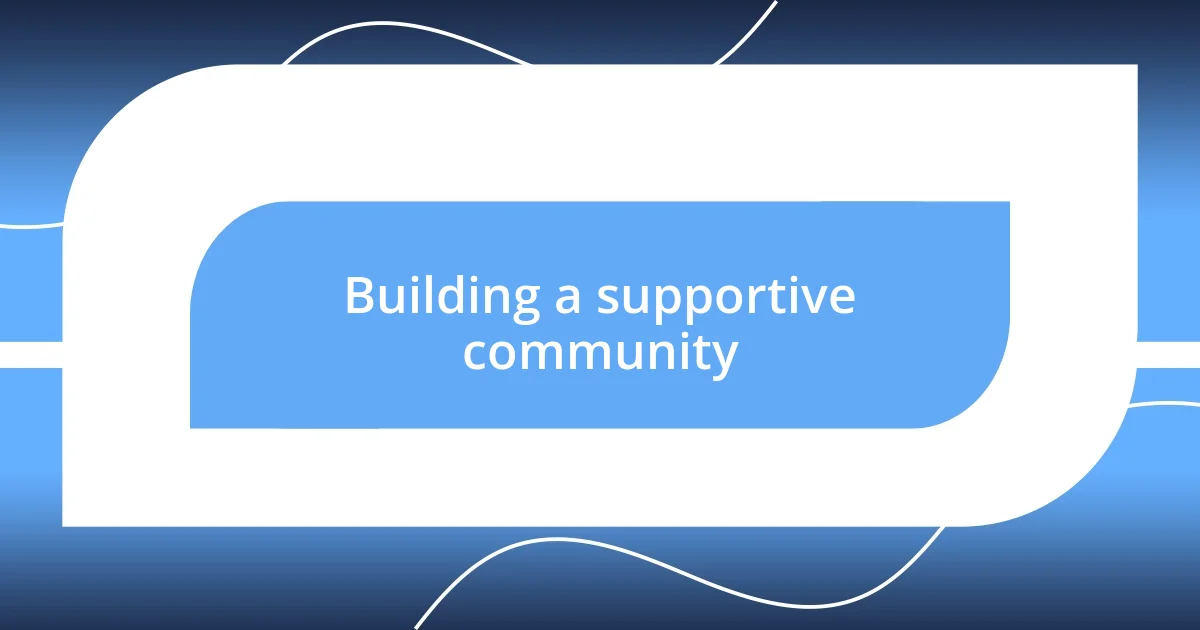
Building a supportive community
Building a supportive community is essential in our journey toward sustainability. When I first joined a local gardening group focused on native plants, I was struck by the energy and passion everyone shared. It felt like a warm embrace as we exchanged tips and tricks, and even shared scrounged seeds with one another. That camaraderie turned a simple hobby into a meaningful connection with others who cared about nurturing our local ecosystem.
As I began to attend more community events, I noticed how sharing personal experiences became a vital part of our gatherings. I vividly recall a potluck where everyone brought a dish made from locally sourced ingredients. The pride on people’s faces as they shared their stories behind each recipe was palpable. It dawned on me that these connections fostered deeper commitments—not just to our planet, but to each other. Isn’t it amazing how food can unite us in so many personal ways?
I’ve also found that perfecting our eco-efforts can sometimes require a bit of accountability from our peers. One time, my neighbor and I challenged each other to reduce our plastic usage for a month by sharing our experiences weekly. The anticipation of our discussions pushed me to dig deeper into sustainable practices, and it was inspiring to witness my neighbor’s enthusiasm as he found alternatives to single-use plastics. How often do we overlook the influence of our support networks on making grounded eco-friendly choices? We’re truly stronger together.
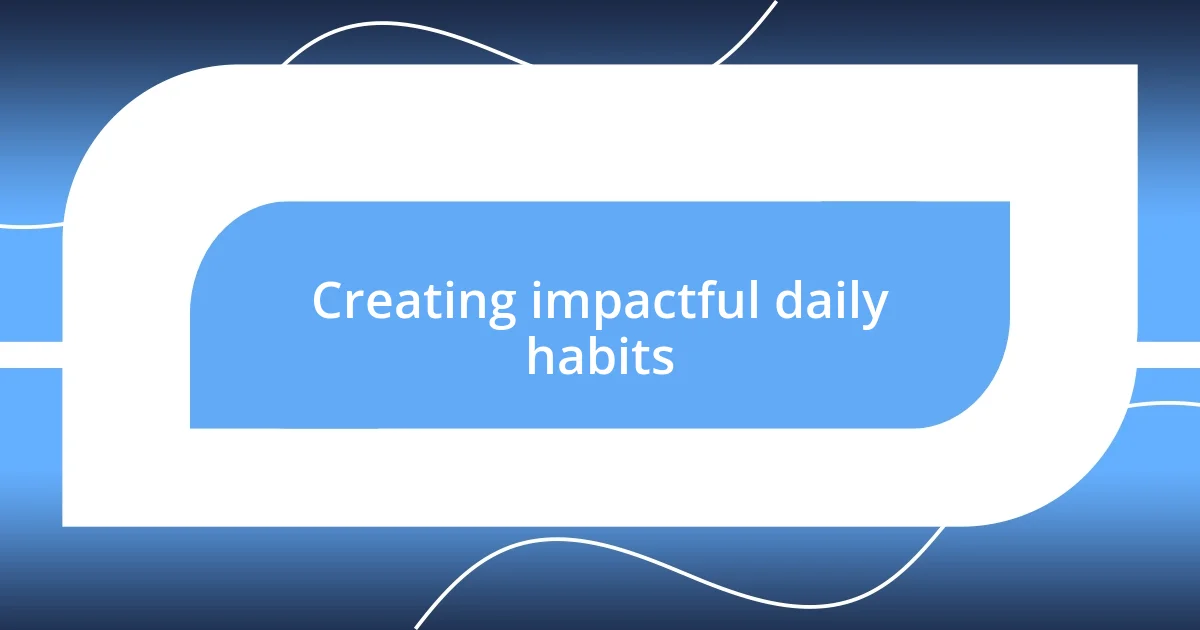
Creating impactful daily habits
Creating impactful daily habits has been a game-changer in my eco-friendly journey. One morning, I decided to shake up my routine by switching to a reusable coffee cup. I still remember the anticipation I felt as I walked into my favorite café, knowing I was making a small but significant choice. It transformed a mundane habit into a statement about my values, and every sip served as a reminder of my commitment.
There are days when I consciously opt to cycle instead of drive. The rush of wind against my face is invigorating, turning what was once a chore into a form of self-care. Plus, the simple act of pedaling to the farmer’s market has not only deepened my connection to the community but also inspired me to embrace the local produce. How incredible is it that my choice to be eco-friendly can also enhance my well-being?
I’ve discovered that consistently practicing mindfulness throughout my day amplifies my eco-friendly habits. When I pause to think before I buy, I weigh the environmental impacts of each purchase. It’s this awareness that has led me to challenge my consumption patterns, like choosing second-hand items over new ones. Each little decision accumulates, and it makes me curious—what other habits could I adopt that would further align with my values? Embracing this reflective approach has transformed my daily life in ways I never anticipated.
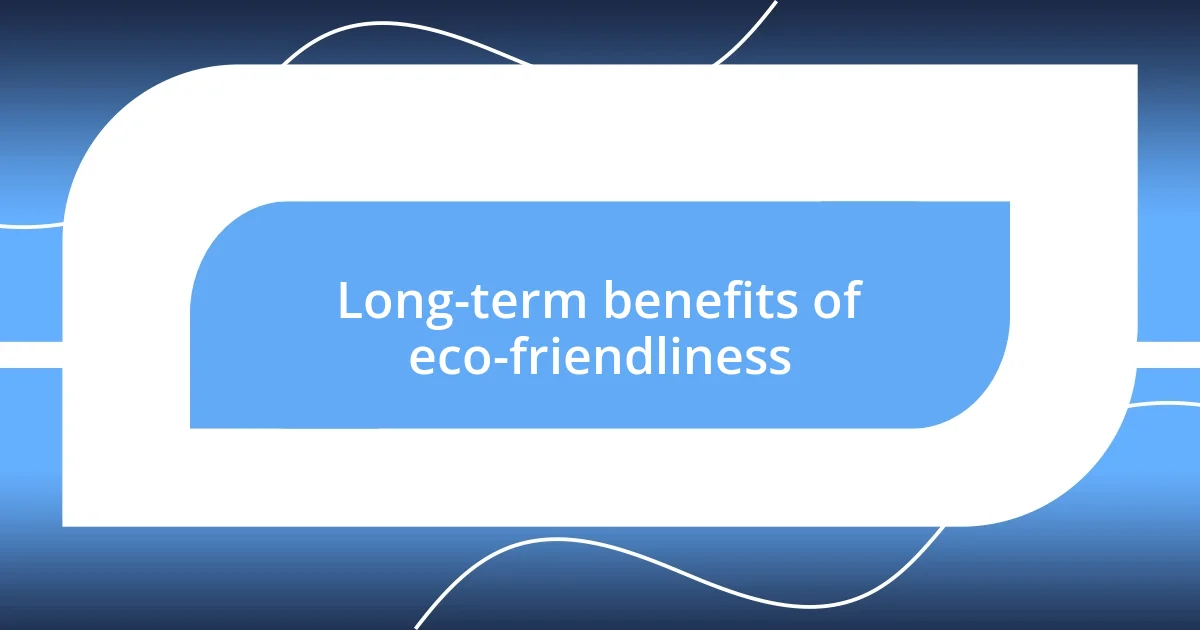
Long-term benefits of eco-friendliness
Adopting eco-friendly practices has long-term benefits that often extend beyond just environmental impact. For example, when I chose to install solar panels on my roof, I vividly recall the initial investment soundly echoed in my budget. However, the energy savings over the years have significantly reduced my utility bills, providing both financial relief and a sense of satisfaction that my home contributes to a greener planet. Isn’t it remarkable how one decision can provide continuous rewards?
I’ve noticed that my commitment to an eco-friendly lifestyle has led to unexpected personal growth. One winter, while attending a workshop on sustainable living, I met individuals from diverse backgrounds who shared compelling stories about their journeys. It struck me how our collective dedication to the environment fostered resilience and creativity within our communities. I often find myself pondering: how does engaging with others on sustainable choices enrich not only our lives but also the lives of those around us?
Another long-term benefit has been the shift in my mindset toward consumption. Each time I opt for sustainable products, I feel as though I’m not just supporting eco-friendly businesses, but I’m also influencing a larger movement. I vividly remember the thrill of shopping at an eco-conscious store, where I discovered reusable alternatives to everyday items I had always taken for granted. It felt empowering! What if we all tapped into this sense of purpose? Embracing eco-friendly choices has transformed my perspective, knowing I’m part of a larger narrative that champions a healthier Earth for future generations.


